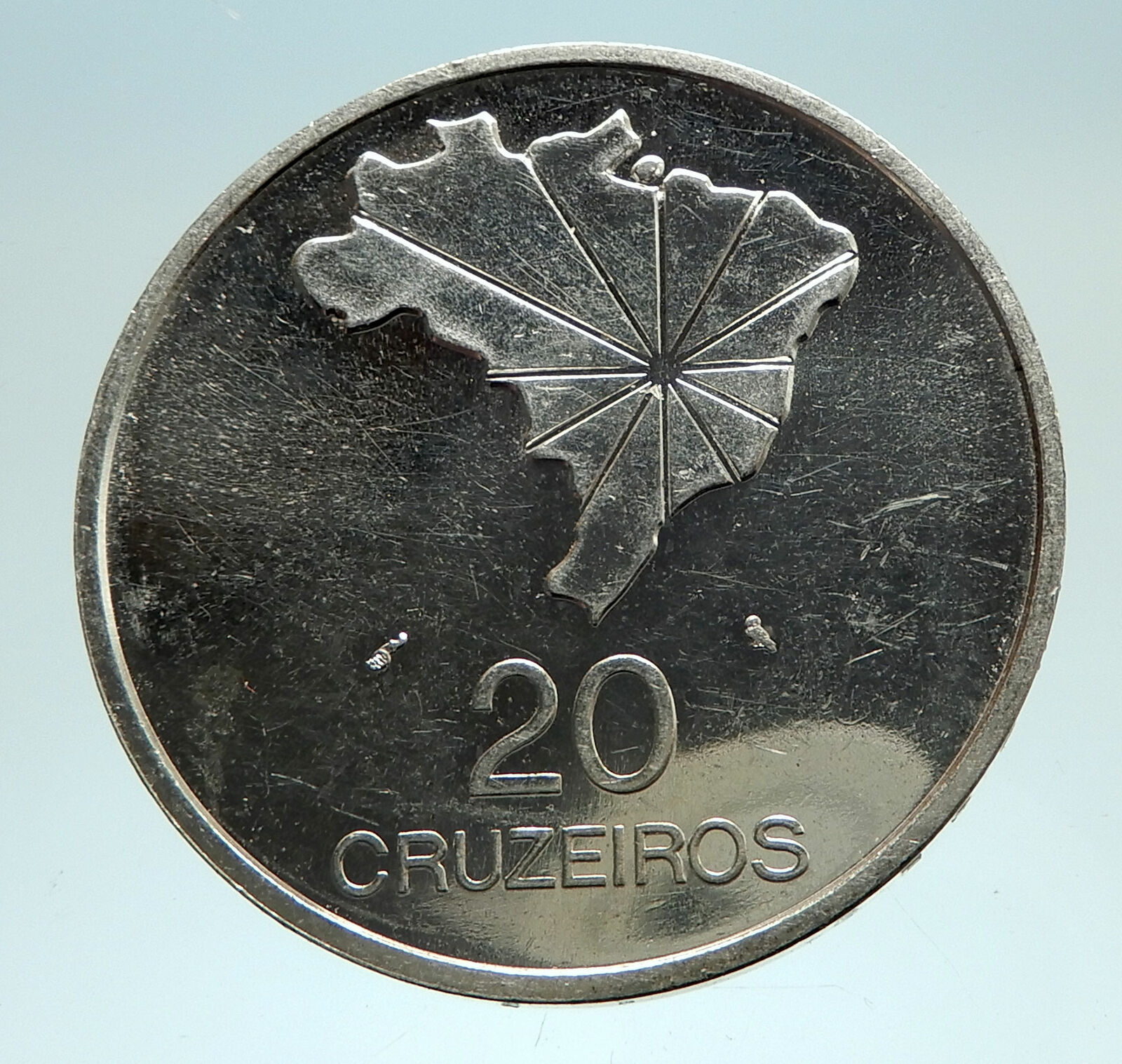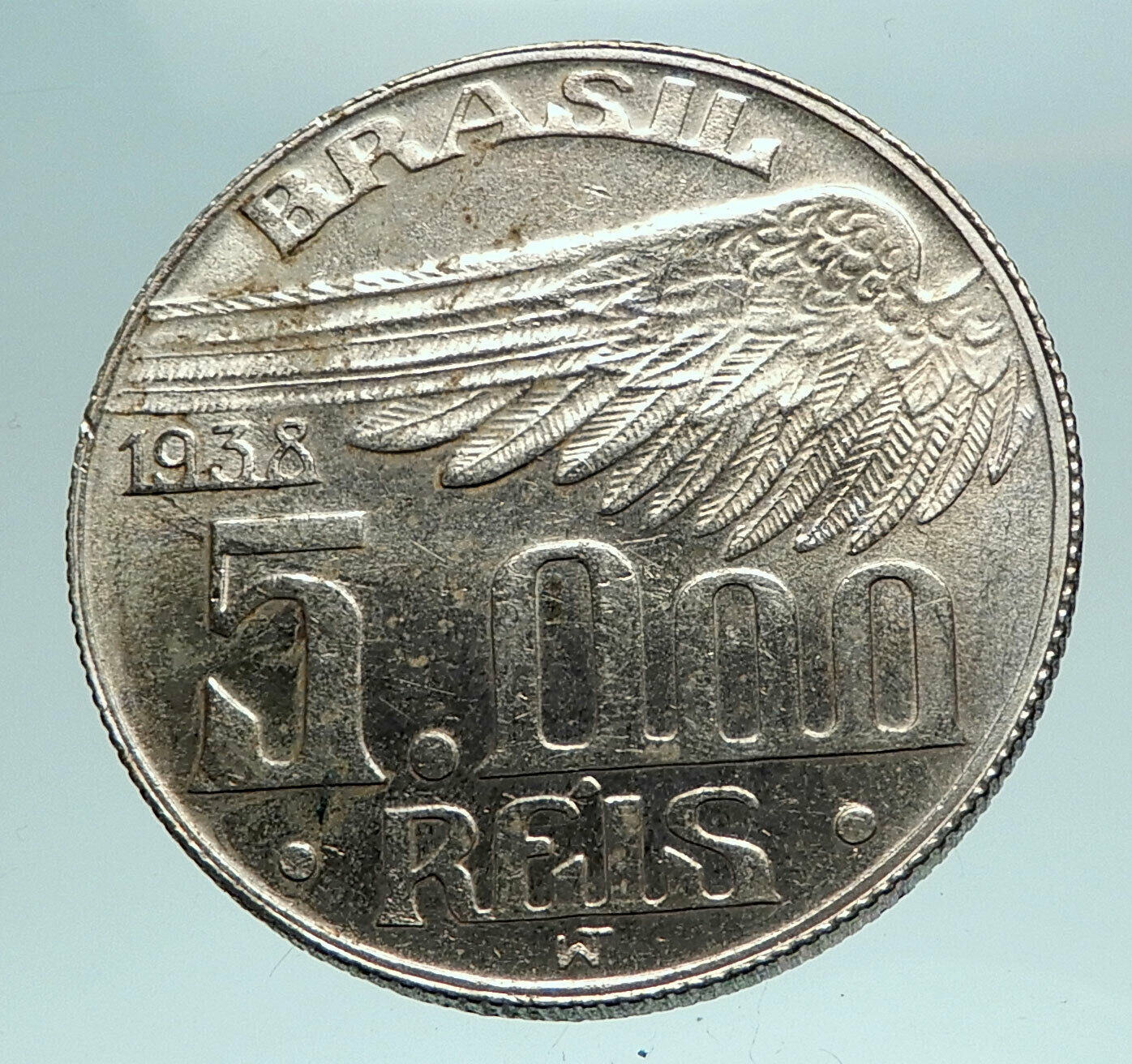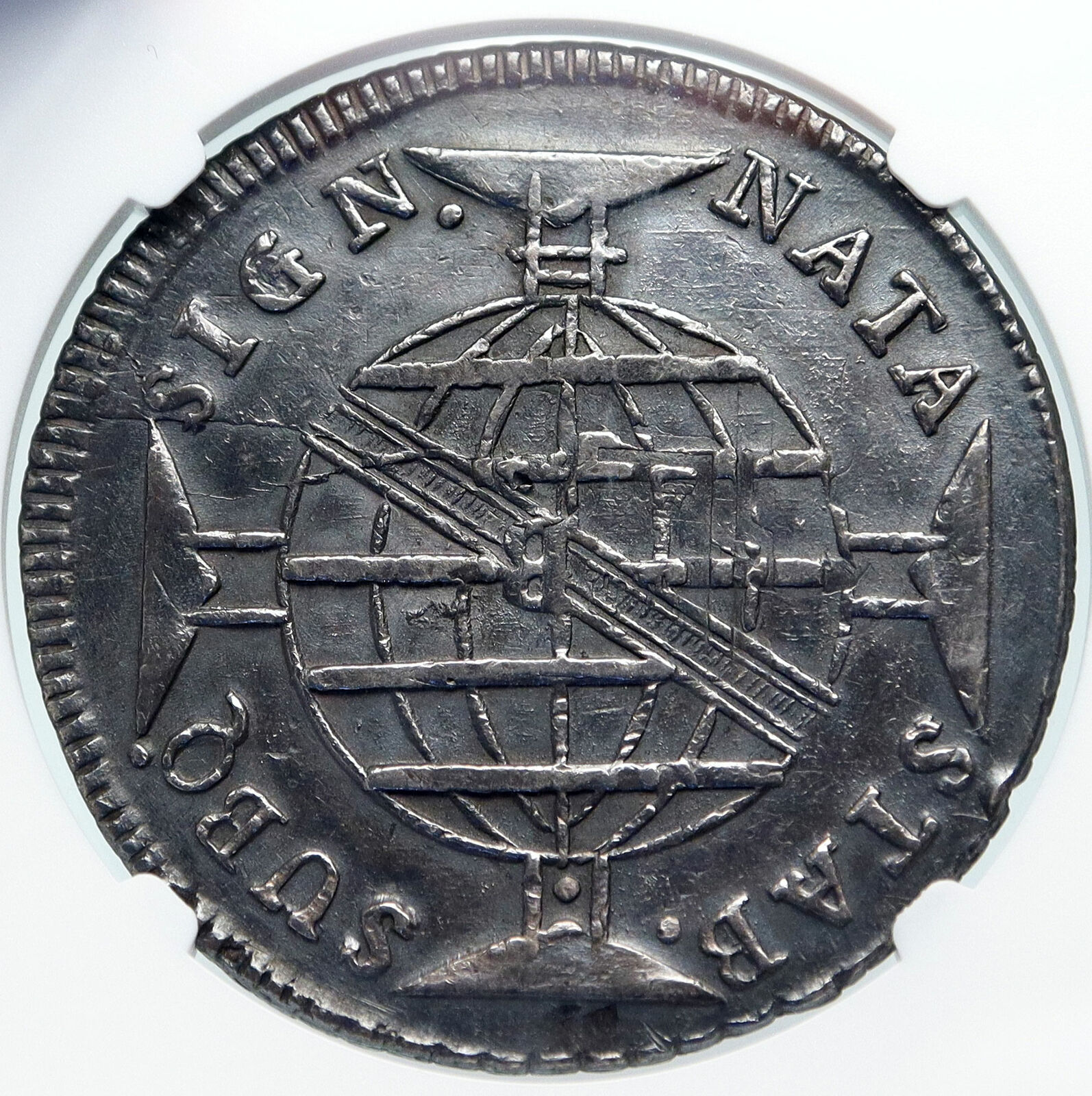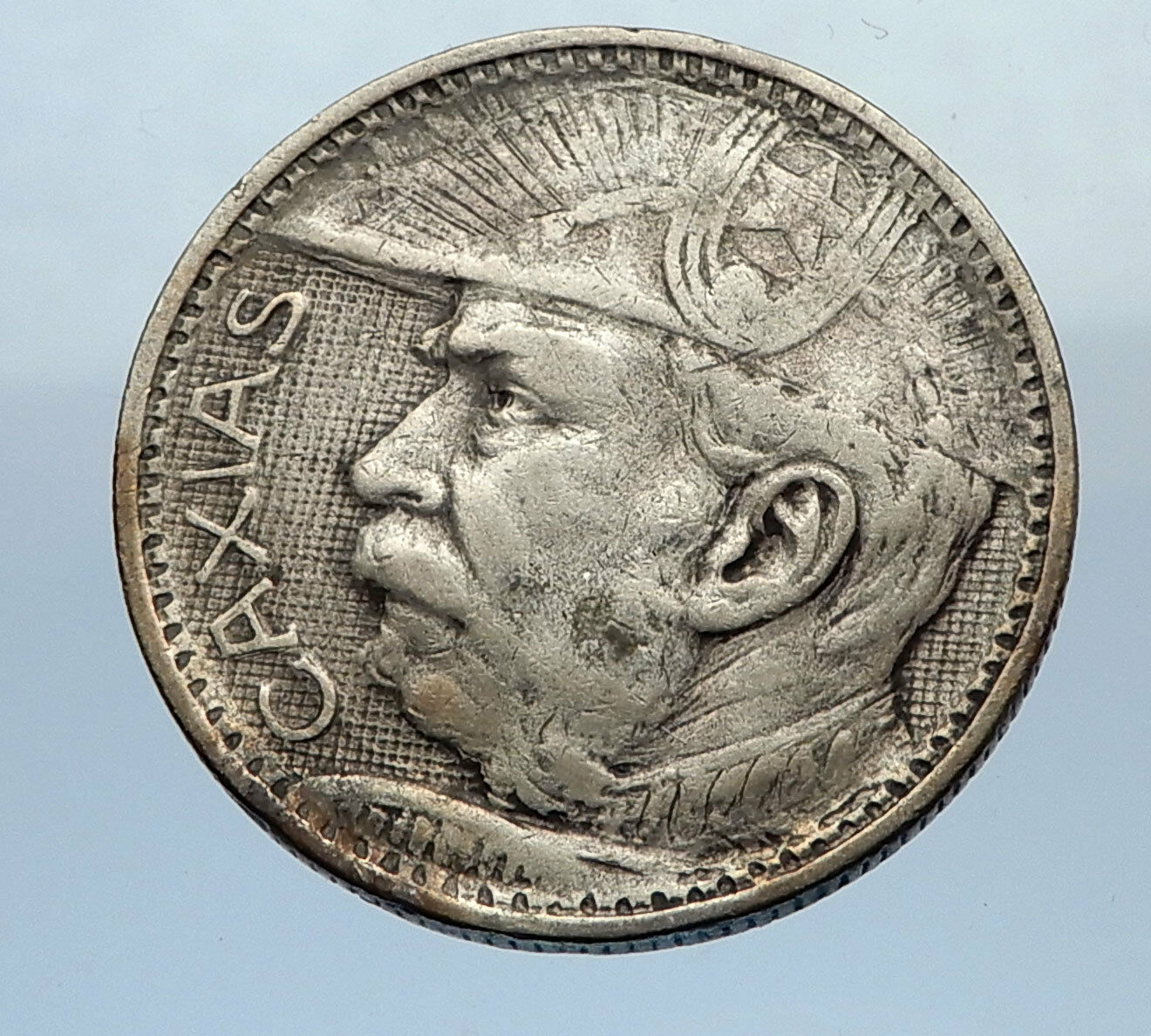|
Brazil – 400th Anniversary of Colonization – Joao III
1932 Silver 2000 Reis 26mm (7.94 grams) 0.500 Silver (0.1270 oz. ASW)
Reference: KM# 485 | Engraver: Leopoldo Campos, Arlindo Bastos
IV· CENTENA RIO·DA· COLO NIZA ÇÃO·DO· BRASIL 1532 1932, Bust of (John) D. João III, King of Portugal 1/2 right.
2000 RÉIS, Royal Coat-of-Arms of King D. João III “of Portugal”.
You are bidding on the exact item pictured, provided with a Certificate of Authenticity and Lifetime Guarantee of Authenticity.
 John III (João III Portuguese pronunciation: June 1502 – 11 June 1557) nicknamed The Pious (Portuguese: “o Piedoso” the King of Portugal and the Algarves from 13 December 1521 to 11 June 1557. He was the son of King Manuel I and Maria of Aragon, the third daughter of King Ferdinand II of Aragon and Queen Isabella I of Castile. John succeeded his father in 1521 at the age of nineteen. John III (João III Portuguese pronunciation: June 1502 – 11 June 1557) nicknamed The Pious (Portuguese: “o Piedoso” the King of Portugal and the Algarves from 13 December 1521 to 11 June 1557. He was the son of King Manuel I and Maria of Aragon, the third daughter of King Ferdinand II of Aragon and Queen Isabella I of Castile. John succeeded his father in 1521 at the age of nineteen.
During his rule Portuguese possessions were extended in Asia and in the New World through the Portuguese colonization of Brazil. John III’s policy of reinforcing Portugal’s bases in India (such as Goa) secured Portugal’s monopoly over the spice trade of cloves and nutmeg from the Maluku Islands, resulting in what John III has been called: the “Grocer King”. On the eve of his death in 1557, the Portuguese empire had a global dimension and spanned almost 4 million square kilometres (1.5 million square miles).
During his reign, the Portuguese became the first Europeans to make contact with both China (under the Ming dynasty) and Japan (during the Muromachi period). He abandoned the Muslim territories in North Africa in favor of the trade with India and investments in Brazil. In Europe he improved relations with the Baltic region and the Rhineland, hoping that this would bolster Portuguese trade.
 Brazil, officially the Federative Republic of Brazil, is the largest country in both South America and Latin America. As the world’s fifth-largest country by both area and population, it is the largest country to have Portuguese as an official language-and the only one in the Americas. Brazil, officially the Federative Republic of Brazil, is the largest country in both South America and Latin America. As the world’s fifth-largest country by both area and population, it is the largest country to have Portuguese as an official language-and the only one in the Americas.
Bounded by the Atlantic Ocean on the east, Brazil has a coastline of 7,491 km (4,655 mi). It borders all other South American countries except Ecuador and Chile and covers 47.3% of the continent’s land area. Its Amazon River basin includes a vast tropical forest, home to diverse wildlife, a variety of ecological systems, and extensive natural resources spanning numerous protected habitats. This unique environmental heritage makes Brazil one of 17 megadiverse countries, and is the subject of significant global interest and debate regarding deforestation and environmental protection.
 Brazil was inhabited by numerous tribal nations prior to the landing in 1500 of explorer Pedro Álvares Cabral, who claimed the area for the Portuguese Empire. Brazil remained a Portuguese colony until 1808, when the capital of the empire was transferred from Lisbon to Rio de Janeiro. In 1815, the colony was elevated to the rank of kingdom upon the formation of the United Kingdom of Portugal, Brazil and the Algarves. Independence was achieved in 1822 with the creation of the Empire of Brazil, a unitary state governed under a constitutional monarchy and a parliamentary system. The ratification of the first constitution in 1824 led to the formation of a bicameral legislature, now called the National Congress. The country became a presidential republic in 1889 following a military coup d’état. An authoritarian military junta came to power in 1964 and ruled until 1985, after which civilian governance resumed. Brazil’s current constitution, formulated in 1988, defines it as a democratic federal republic. The federation is composed of the union of the Federal District, the 26 states, and the 5,570 municipalities. Brazil was inhabited by numerous tribal nations prior to the landing in 1500 of explorer Pedro Álvares Cabral, who claimed the area for the Portuguese Empire. Brazil remained a Portuguese colony until 1808, when the capital of the empire was transferred from Lisbon to Rio de Janeiro. In 1815, the colony was elevated to the rank of kingdom upon the formation of the United Kingdom of Portugal, Brazil and the Algarves. Independence was achieved in 1822 with the creation of the Empire of Brazil, a unitary state governed under a constitutional monarchy and a parliamentary system. The ratification of the first constitution in 1824 led to the formation of a bicameral legislature, now called the National Congress. The country became a presidential republic in 1889 following a military coup d’état. An authoritarian military junta came to power in 1964 and ruled until 1985, after which civilian governance resumed. Brazil’s current constitution, formulated in 1988, defines it as a democratic federal republic. The federation is composed of the union of the Federal District, the 26 states, and the 5,570 municipalities.
.svg/250px-Brazil_(orthographic_projection).svg.png) Brazil’s economy is the world’s ninth-largest by nominal GDP and seventh-largest by GDP (PPP) as of 2015. A member of the BRICS group, Brazil until 2010 had one of the world’s fastest growing major economies, with its economic reforms giving the country new international recognition and influence. Brazil’s national development bank plays an important role for the country’s economic growth. Brazil is a founding member of the United Nations, the G20, BRICS, Unasul, Mercosul, Organization of American States, Organization of Ibero-American States, CPLP, and the Latin Union. Brazil is a regional power in Latin America and a middle power in international affairs, with some analysts identifying it as an emerging global power. One of the world’s major breadbaskets, Brazil has been the largest producer of coffee for the last 150 years. Brazil’s economy is the world’s ninth-largest by nominal GDP and seventh-largest by GDP (PPP) as of 2015. A member of the BRICS group, Brazil until 2010 had one of the world’s fastest growing major economies, with its economic reforms giving the country new international recognition and influence. Brazil’s national development bank plays an important role for the country’s economic growth. Brazil is a founding member of the United Nations, the G20, BRICS, Unasul, Mercosul, Organization of American States, Organization of Ibero-American States, CPLP, and the Latin Union. Brazil is a regional power in Latin America and a middle power in international affairs, with some analysts identifying it as an emerging global power. One of the world’s major breadbaskets, Brazil has been the largest producer of coffee for the last 150 years.
|





 John III (João III Portuguese pronunciation: June 1502 – 11 June 1557) nicknamed The Pious (Portuguese: “o Piedoso” the King of Portugal and the Algarves from 13 December 1521 to 11 June 1557. He was the son of King Manuel I and Maria of Aragon, the third daughter of King Ferdinand II of Aragon and Queen Isabella I of Castile. John succeeded his father in 1521 at the age of nineteen.
John III (João III Portuguese pronunciation: June 1502 – 11 June 1557) nicknamed The Pious (Portuguese: “o Piedoso” the King of Portugal and the Algarves from 13 December 1521 to 11 June 1557. He was the son of King Manuel I and Maria of Aragon, the third daughter of King Ferdinand II of Aragon and Queen Isabella I of Castile. John succeeded his father in 1521 at the age of nineteen. Brazil, officially the Federative Republic of Brazil, is the largest country in both South America and Latin America. As the world’s fifth-largest country by both area and population, it is the largest country to have Portuguese as an official language-and the only one in the Americas.
Brazil, officially the Federative Republic of Brazil, is the largest country in both South America and Latin America. As the world’s fifth-largest country by both area and population, it is the largest country to have Portuguese as an official language-and the only one in the Americas. Brazil was inhabited by numerous tribal nations prior to the landing in 1500 of explorer Pedro Álvares Cabral, who claimed the area for the Portuguese Empire. Brazil remained a Portuguese colony until 1808, when the capital of the empire was transferred from Lisbon to Rio de Janeiro. In 1815, the colony was elevated to the rank of kingdom upon the formation of the United Kingdom of Portugal, Brazil and the Algarves. Independence was achieved in 1822 with the creation of the Empire of Brazil, a unitary state governed under a constitutional monarchy and a parliamentary system. The ratification of the first constitution in 1824 led to the formation of a bicameral legislature, now called the National Congress. The country became a presidential republic in 1889 following a military coup d’état. An authoritarian military junta came to power in 1964 and ruled until 1985, after which civilian governance resumed. Brazil’s current constitution, formulated in 1988, defines it as a democratic federal republic. The federation is composed of the union of the Federal District, the 26 states, and the 5,570 municipalities.
Brazil was inhabited by numerous tribal nations prior to the landing in 1500 of explorer Pedro Álvares Cabral, who claimed the area for the Portuguese Empire. Brazil remained a Portuguese colony until 1808, when the capital of the empire was transferred from Lisbon to Rio de Janeiro. In 1815, the colony was elevated to the rank of kingdom upon the formation of the United Kingdom of Portugal, Brazil and the Algarves. Independence was achieved in 1822 with the creation of the Empire of Brazil, a unitary state governed under a constitutional monarchy and a parliamentary system. The ratification of the first constitution in 1824 led to the formation of a bicameral legislature, now called the National Congress. The country became a presidential republic in 1889 following a military coup d’état. An authoritarian military junta came to power in 1964 and ruled until 1985, after which civilian governance resumed. Brazil’s current constitution, formulated in 1988, defines it as a democratic federal republic. The federation is composed of the union of the Federal District, the 26 states, and the 5,570 municipalities..svg/250px-Brazil_(orthographic_projection).svg.png) Brazil’s economy is the world’s ninth-largest by nominal GDP and seventh-largest by GDP (PPP) as of 2015. A member of the BRICS group, Brazil until 2010 had one of the world’s fastest growing major economies, with its economic reforms giving the country new international recognition and influence. Brazil’s national development bank plays an important role for the country’s economic growth. Brazil is a founding member of the United Nations, the G20, BRICS, Unasul, Mercosul, Organization of American States, Organization of Ibero-American States, CPLP, and the Latin Union. Brazil is a regional power in Latin America and a middle power in international affairs, with some analysts identifying it as an emerging global power. One of the world’s major breadbaskets, Brazil has been the largest producer of coffee for the last 150 years.
Brazil’s economy is the world’s ninth-largest by nominal GDP and seventh-largest by GDP (PPP) as of 2015. A member of the BRICS group, Brazil until 2010 had one of the world’s fastest growing major economies, with its economic reforms giving the country new international recognition and influence. Brazil’s national development bank plays an important role for the country’s economic growth. Brazil is a founding member of the United Nations, the G20, BRICS, Unasul, Mercosul, Organization of American States, Organization of Ibero-American States, CPLP, and the Latin Union. Brazil is a regional power in Latin America and a middle power in international affairs, with some analysts identifying it as an emerging global power. One of the world’s major breadbaskets, Brazil has been the largest producer of coffee for the last 150 years.




